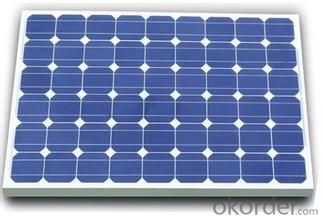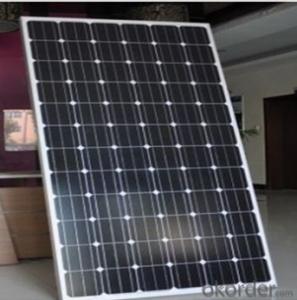5000W Solar Home Solution Approved by TUV UL CE
- Loading Port:
- China main port
- Payment Terms:
- TT OR LC
- Min Order Qty:
- 1 pc
- Supply Capability:
- 100 pc/month
OKorder Service Pledge
OKorder Financial Service
You Might Also Like
Item specifice
5000W Solar Home Solution Approved by TUV UL CE
Production description
PV array:
Convert sunlight instantly into DC electric power. Formed by the solar modules (also called photovoltaic
modules) in accordance with the system requirements for series and parallel.
Solar charge controller:
Battery banks:
Stores energy when there is an excess coming in and distribute it back out when there is a demand. Solar
PV panels continue to re-charge batteries each day to maintain battery charge.

Feature
1.High conversion efficiencies resulting in superior power output performance.
2.Outstanding power output even in low light or high temperature conditions
3.Optimized design for ease of soldering and lamination
4.Long-term stability,reliability and performance
5.Low breakage rate
6.Color uniformaity
Physical characteristic
1. Rigorous quality control meets the highest international standards.
2. High-transmissivity low-iron tempered glass, strong aluminium frame.
3. Using UV-resistant silicon.
4. IS09001/14001/CE/TUV/UL
- Q:Can solar energy systems be used for powering irrigation systems?
- Yes, solar energy systems can be used to power irrigation systems. Solar panels can generate electricity that can be used to operate pumps and other equipment necessary for irrigation. This can provide a sustainable and cost-effective solution for powering irrigation systems, especially in remote areas where access to electricity is limited. Additionally, solar energy is renewable and does not produce greenhouse gas emissions, making it an environmentally friendly choice for powering irrigation systems.
- Q:How do solar energy systems impact air quality?
- Solar energy systems have a positive impact on air quality as they generate clean energy without emitting harmful pollutants or greenhouse gases. This reduces air pollution and helps combat climate change, leading to improved air quality and better respiratory health for individuals.
- Q:Can a solar energy system be installed on a floating platform?
- Indeed, it is possible to install a solar energy system on a floating platform. Floating photovoltaic (FPV) systems, also known as floating solar power plants, are becoming popular as an innovative solution to make the most of water bodies for solar energy generation. Typically, these platforms are built using buoyant materials like plastic or concrete, enabling the solar panels to float on the water's surface. There are various advantages to installing solar panels on floating platforms. Firstly, it allows for the utilization of underused water bodies such as reservoirs, dams, and ponds, hence optimizing land use. Secondly, the water beneath the solar panels helps cool them down, enhancing their efficiency and overall energy output. Additionally, the floating platforms can reduce evaporation from the water surface, thus conserving water resources. Floating solar energy systems also offer environmental benefits. By harnessing water bodies for solar energy generation, these systems decrease the need to clear land for large-scale solar installations, thereby preserving ecosystems and biodiversity. Moreover, they can aid in reducing algae growth and improving water quality by shading the water surface and limiting sunlight penetration. While floating solar systems present unique engineering challenges, such as anchoring and stability, technological advancements have made them increasingly feasible and cost-effective. Several countries, including Japan, China, and the Netherlands, have successfully implemented floating solar power plants, demonstrating their potential as a sustainable energy solution. In summary, it is indeed possible to install a solar energy system on a floating platform. These floating photovoltaic systems offer numerous benefits, such as optimized land use, increased energy efficiency, water conservation, and environmental preservation. As technology continues to advance, we can expect to witness the worldwide deployment of more floating solar power plants.
- Q:How do solar energy systems affect the insurance premiums of a property?
- Solar energy systems can have both positive and negative effects on insurance premiums for a property. On one hand, installing solar panels can increase the value of a property, which may result in higher insurance premiums. Additionally, the cost of replacing or repairing solar panels in case of damage or theft can also contribute to higher premiums. On the other hand, some insurance companies offer discounts or incentives for properties with solar energy systems due to their reduced reliance on traditional energy sources and lower environmental impact. Ultimately, the impact on insurance premiums will vary depending on the insurance company and specific circumstances of the property.
- Q:Can solar energy systems be used in areas with limited access to solar energy permits and approvals?
- Yes, solar energy systems can still be used in areas with limited access to solar energy permits and approvals. While permits and approvals help ensure safety and compliance, there are alternative options available. Off-grid solar systems can be installed without the need for permits, making them suitable for remote or inaccessible areas. Additionally, some regions have simplified permitting processes or exemptions for small-scale solar installations. Moreover, advancements in technology have made solar panels more efficient, allowing them to generate electricity even in areas with less sunlight. Overall, while permits and approvals may present challenges, solar energy systems can still be utilized in areas with limited access to them.
- Q:Can solar energy systems be used in areas with high population density?
- Yes, solar energy systems can be used in areas with high population density. In fact, solar energy systems can be particularly beneficial in densely populated areas as they can be installed on rooftops, buildings, and other available spaces, making efficient use of limited land resources. Additionally, solar energy systems can help reduce reliance on traditional energy sources, decrease greenhouse gas emissions, and contribute to a cleaner and more sustainable environment for densely populated communities.
- Q:Solar power generation system suitable for home, how much is the cost of a set?
- The use of solar power system has many parts, have the power of this parameter, he said 500W1000W is a parameter which kind of accessories, and electricity related degree is large, panels, solar power systems, accessories, solar panels for electricity generating capacity of the inverter board and the two parts of the largest correlation under normal circumstances, the board 1000W day power of 4
- Q:How does the efficiency of solar panels affect the performance of a solar energy system?
- The overall performance of a solar energy system is heavily influenced by the efficiency of solar panels. Panels with higher efficiency can convert more sunlight into electricity, resulting in greater energy production. This means that a solar energy system equipped with efficient panels can generate more power and meet a larger portion of the electricity demand. One of the main advantages of using highly efficient solar panels is that it allows for a smaller system size. Since each panel produces more electricity per unit of area, fewer panels are required to achieve the desired energy output. This not only saves installation space but also reduces the overall cost of the system. Additionally, a smaller system size means less maintenance and fewer potential points of failure, which improves the reliability and lifespan of the solar energy system. Furthermore, the efficiency of solar panels directly impacts the economic feasibility of a solar energy system. More efficient panels generate more electricity, which can offset a greater portion of energy consumption, leading to reduced utility bills. In some cases, excess electricity can be sent back to the grid, enabling net metering or even earning credits, further enhancing the financial benefits. A highly efficient solar energy system can also offer a quicker return on investment, making it a more appealing option for homeowners and businesses. Moreover, the efficiency of solar panels has a significant environmental impact. By converting more sunlight into electricity, highly efficient panels can reduce reliance on fossil fuel-based power generation, resulting in lower greenhouse gas emissions. This contributes to a cleaner and more sustainable energy future. The environmental benefits of efficient panels are crucial in the fight against climate change and the reduction of the ecological footprint associated with energy consumption. In summary, the efficiency of solar panels has a direct influence on the performance of a solar energy system. More efficient panels lead to increased energy production, smaller system sizes, reduced costs, and improved financial returns. Furthermore, they contribute to a more sustainable future by reducing reliance on fossil fuels and decreasing greenhouse gas emissions. Therefore, investing in highly efficient solar panels is essential for maximizing the effectiveness and benefits of a solar energy system.
- Q:Can solar energy systems be used for powering off-grid eco-industrial parks?
- Yes, solar energy systems can absolutely be used for powering off-grid eco-industrial parks. Solar power is a reliable and sustainable source of energy that can effectively meet the power requirements of these parks. By installing solar panels, these parks can generate their own electricity, reducing their dependence on traditional fossil fuel-based energy sources. This not only helps in minimizing carbon emissions but also promotes sustainability and environmental conservation. Additionally, advancements in solar technology have made it more affordable and efficient, making it an ideal choice for off-grid eco-industrial parks.
- Q:Can solar energy systems be used in areas with limited access to training programs?
- Yes, solar energy systems can be used in areas with limited access to training programs. While training programs can be helpful in understanding the technical aspects of installing and maintaining solar energy systems, there are various resources available that can still enable individuals to utilize solar energy. Online tutorials, manuals, and guides can provide valuable information on the installation and operation of solar systems. Additionally, local experts or organizations can offer assistance and support in areas with limited access to formal training programs, ensuring the successful implementation of solar energy systems.
1. Manufacturer Overview |
|
|---|---|
| Location | |
| Year Established | |
| Annual Output Value | |
| Main Markets | |
| Company Certifications | |
2. Manufacturer Certificates |
|
|---|---|
| a) Certification Name | |
| Range | |
| Reference | |
| Validity Period | |
3. Manufacturer Capability |
|
|---|---|
| a)Trade Capacity | |
| Nearest Port | |
| Export Percentage | |
| No.of Employees in Trade Department | |
| Language Spoken: | |
| b)Factory Information | |
| Factory Size: | |
| No. of Production Lines | |
| Contract Manufacturing | |
| Product Price Range | |
Send your message to us
5000W Solar Home Solution Approved by TUV UL CE
- Loading Port:
- China main port
- Payment Terms:
- TT OR LC
- Min Order Qty:
- 1 pc
- Supply Capability:
- 100 pc/month
OKorder Service Pledge
OKorder Financial Service
Similar products
New products
Hot products
Hot Searches
Related keywords





























